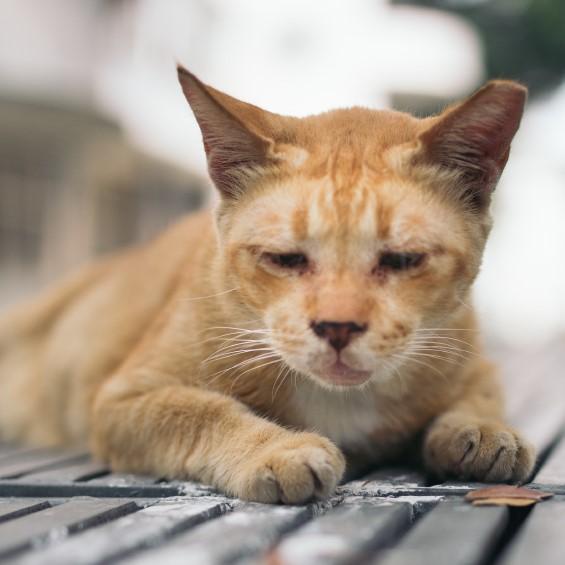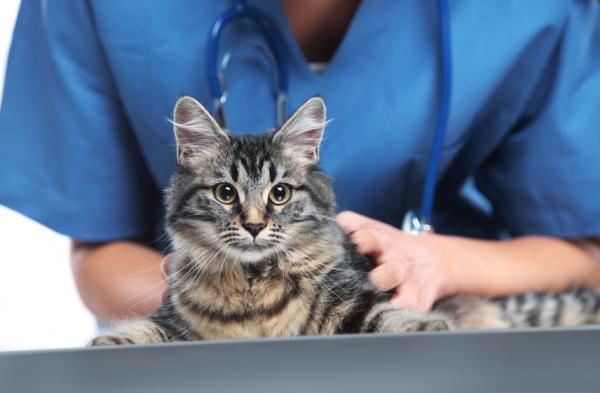Care for a blind cat

Blindness is the partial or total loss of vision, may be due to a congenital or acquired cause following a trauma or illness such as high blood pressure, a cataract or glaucoma. Whether you have a kitten blind from birth or your old cat has lost vision, it’s stressful at first for both you and your cat.
But you should know that blindness does not have to prevent your cat from living a happy and adventurous life. Cats are beings with resilience, that is, they are able to adapt to difficult and even traumatizing situations, and if you help them doing some adaptations in the house to make life easier and giving you the necessary care your cat will know how to adapt to have a happy life.
In this article we are going to give you advice on care for a blind cat.
Determine if your cat is blind
A cat with problems of blindness may have inflamed eyes, discolored, with a certain opacity, its Pupils they are big and they do not contract when receiving light. If you are blind or if you are losing part of your vision, your cat may be easily startled or you may appear confused after a piece of furniture has been moved around the house or even tripped over. hit a piece of furniture. If you observe one of these signs you should take your cat to the veterinarian to determine with certainty if your cat is blind or not.
In some cases blindness can be reversible, but if it turns out to be an irreversible blindness, you can help: a cat has a much more developed sense of hearing and smell than the human and can allow it compensate for a loss of vision.
If it’s an acquired blindness that appeared suddenly, your cat may need a few weeks to adjust to his new life.

Tips for a blind cat
- La oral communication between you and your cat becomes paramount when you lose your vision: talk to your cat frequently and call him more than before so he can place you in the house because of your voice. When you reach a room try to walk making noise so that your cat knows that you are entering and avoid frightening him.
- Keep a quiet environment: Avoid screaming or slamming doors in the house, they would scare your cat more than before and you should avoid stressing your cat, especially in his period of adaptation to his new life.
- Play with your cat and stimulates your other senses: you can provide toys that give off an odor or that have a rattle or make a noise, this type of toy usually like a blind cat.
- Mimes: do not stop paying attention and the pampering you used to give him, the caresses and the moments with you will like him even more than before, try to spend more time with your cat but respect his independence and let him go when he shows you he has had enough.
Adapt your house to your blind cat
- Avoid the changes: the first thing is to avoid making changes in the house and avoid moving furniture. What your cat needs is some stability to recognize its surroundings since it does not see that it needs the disposition of the objects of the house not to change so as not to lose its reference points.
- Keep your references: always place your food and water in the same place so you know where to find it, moving it could be a source of stress for your cat.
- Your sandbox: If your cat suddenly became blind, you may have to teach him again: you put him on his tray and let him find the way from there to his basket so that your cat remembered where the tray is. You may need to add another tray in the house if it is large or if it has several floors.
- Security: close the step to the stairs to avoid that your cat falls on them to avoid climbing because if you have access to a balcony or a window you will not be able to perceive the height and could be killed when falling.
- Think of small details: How can it be to always lower the lid of the toilet. Your cat does not see, and it is better to avoid this kind of bad experience that could even be dangerous.
- Avoid leaving objects on the floor of the house: your cat could trip or get scared and lose the house.

Security outside the house
A blind cat should not be outdoors without supervision: it should only stay inside the house or have access to a safe and closed garden with fences. If you can not keep an eye on him outside, it’s better to stay inside the house. You can also walk him by putting a harness and a strap. Discover how to teach a cat to ride on a leash.
It is especially important that your cat carry a chip if it is blind so that if it is lost and someone finds it a veterinarian will be able to read its microchip and contact you.

Caring for a blind cat is complicated at first, but can be accomplished with patience and a lot of affection. We recommend that you also inform yourself about how to care for an elderly cat if this is your case. Remember that older cats should be treated with much more care and perseverance.
You may also be interested to know why your cat is mauling, an essential issue to strengthen your relationship at this time and learn to communicate better.

If you want to read more articles similar to Care for a blind cat, we recommend that you enter in our section of extra care.


